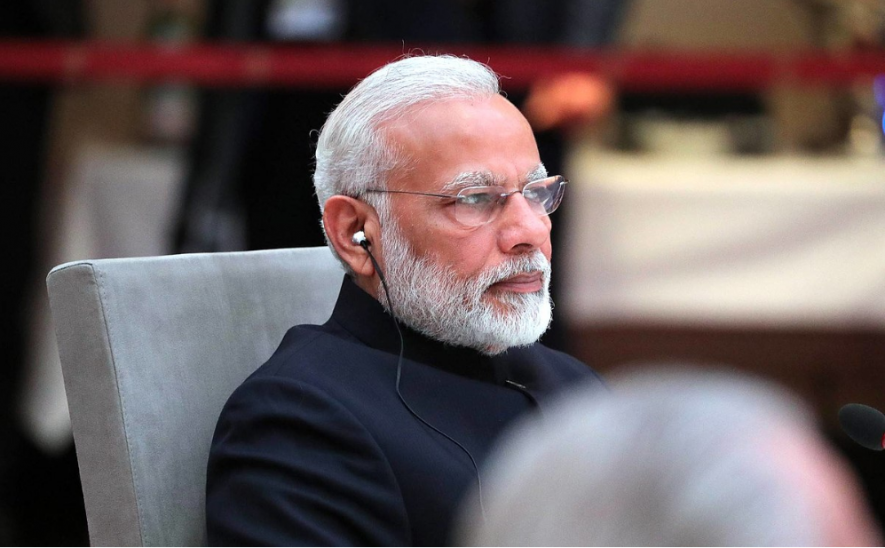PM Modi’s Narcissism Explains Raids on BBC

Image caption - File Photo | Image courtesy: Wikimedia Commons
On 14 February 2019, a suicide bomber attacked an army convoy in Pulwama, Jammu and Kashmir, killing 40 Central Reserve Police Force jawans, plunging the nation into shock and dismay. The world shuddered as the nuclear-armed neighbours—India and Pakistan—undertook retaliatory air strikes against each other.
On the fourth anniversary of the Pulwama attack, Income Tax sleuths poured into the BBC offices in Delhi and Mumbai for what, in bureaucratese, is called survey. The BBC raids became global news, and the world will, in days to come, lament Indian
democracy’s free fall.
When the suicide bomber killed 40 CRPF jawans, just about every Indian knew that Prime Minister Narendra Modi, already campaigning for the 2019 Lok Sabha election, would strike at Pakistan. By contrast, nobody thought Modi would retaliate against the BBC for telecasting, in January, India: The Modi Question.
It was not that the nation underestimated Modi’s capacity to give no quarter to his rivals and critics. But there were reasons why even journalists did not see the raids coming. For one, Modi had already repeatedly proved that the 2002 carnage in Gujarat was not an impediment to realising his electoral ambitions. For the other, Modi’s action against the BBC would invariably invite international opprobrium—and startle those Indians who think of the BBC, even today, as an objective, reliable and credible media outlet.
Yet, when seen from the perspective of psychologists, the BBC raids make sense and even seem inevitable in hindsight. Modi has been assiduously cultivating a persona of a global leader, a statesman, a personality no less than Nehru, swaying the masses at home and leaving his footprint worldwide. In this endeavour of his, he wants the memory of the 2002 riots to be effaced from the national consciousness. The BBC documentary has not only rekindled the memory of the 2002 riots—but made it global in scale.
Psychoanalysts would say India: The Modi Question inflicted a narcissistic injury on Modi. For him, the only way to heal this injury was to make the BBC suffer.
Narcissism is a term often misunderstood and, worse, misused. Psychology textbooks say every human being has amour propre, or a sense of self-worth, otherwise known as narcissism. But narcissism is often the defining trait of powerful leaders.
In their seminal essay Narcissism And Leadership: An Object Relations Perspective, Manfred FR Kets de Vries and Danny Miller say, “Narcissism is often the driving force behind the desire to obtain a leadership position. Perhaps individuals with strong narcissistic personality features are more willing to undertake the arduous process of attaining a position of power.” This is indeed true of Modi, who overcame his lower- middle-class background to become Prime Minister.
It is uncanny how the two author’s definition of narcissistic personality applies to Modi.
For instance, they write, “Narcissists feel they must rely on themselves rather than others for the gratification of life’s needs. They live with the assumption that they cannot reliably depend on anyone’s love or loyalty.” This explains the centralisation of governance under him. It is hard to think of anyone in the Cabinet who would consider Modi as their friend.
Since narcissists depend only on themselves, they tend to “become preoccupied with establishing their adequacy, power, beauty, prestige and superiority”. This rationalises Modi’s personal investment in every election, in sharp contrast to other prime ministers.
An electoral loss is a narcissistic wound that must be healed by splitting parties and installing the Bharatiya Janata Party into power. This is necessary for Modi as every defeat threatens his sense of superiority and adequacy.
The fear of inadequacy drives narcissists to “expect others to accept the high esteem in which they hold themselves, and to cater to their needs… Narcissists live under the illusion that they are entitled to be served; that their own wishes take precedence over those of others. They think they deserve special consideration in life”.
Free media be damned! The right to criticise be damned! We may keep talking about the constitutional rights guaranteed to us, but Modi expects these rights to be subordinate to his wish for glory and greatness. His narcissism has him believe his glory is also India’s glory. Modi’s needs must take precedence over everything else. Media must serve him. And the mainstream media is indeed doing that.
Then, out of the blue, comes the BBC’s documentary, chipping away at his prestige, his superiority. The narcissistic wound needed a healing touch. A government spokesperson dubbed the BBC documentary a manifestation of the organisation’s colonial mindset. A
BJP spokesperson said Modi was judicially absolved of the charges that he had deliberately allowed the riots to rage for days and that he had ordered the police not to interfere in the grisly killing of Muslims.
The Union government blocked the BBC documentary from being viewed in India. The matter could have ended there. But university students found a way around the ‘cyber- wall’ to watch the documentary publicly. Modi’s narcissistic wound deepened. The only way to rediscover the feelings of adequacy and power was to make the BBC suffer—and, therefore, the raids.
Kets de Vries and Danny Miller cite psychoanalyst Wilhelm Reich, who noted this characteristic about narcissistic personalities: “If their vanity is hurt, they react with cold reserve, deep depression or lively aggression.” The BBC has been decidedly a victim of Modi’s aggression.
Sigmund Freud, the founder of psychoanalysis, spoke of a narcissistic libidinal personality, an individual whose main interest is self-preservation, who is independent and impossible to intimidate. A leader who cannot be intimidated would be inclined to perceive any criticism as an attempt to cow him down.
This is why Modi chose t intimidate the BBC—and through the raids, journalists working in the shrinking sphere of free press in India, and all representatives of foreign media stationed in India.
The author is an independent journalist. The views are personal.
Get the latest reports & analysis with people's perspective on Protests, movements & deep analytical videos, discussions of the current affairs in your Telegram app. Subscribe to NewsClick's Telegram channel & get Real-Time updates on stories, as they get published on our website.
























